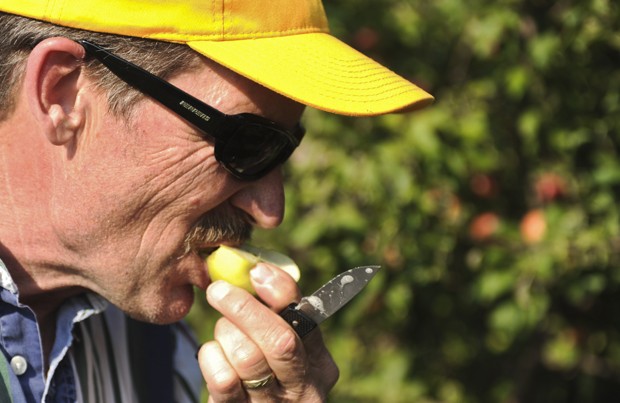While apple lovers throughout the state were enjoying the University of MinnesotaâÄôs new apple last fall, the SweeTango developed a very different reputation among apple growers. Last fall, apple orchards were complaining about an unusually exclusive contract between the University and Pepin Heights Orchard in Lake City, Minn., that they said was signed without their knowledge. Last week, about a dozen growers filed a lawsuit against the University and others involved with the deal. âÄúIt was absolutely signed before many of the apple growers even knew about [the deal],âÄù said the growersâÄô attorney Lisa Lamm Bachman. âÄúI think one of the big questions is, how is it that Pepin Heights came to be the only grower to receive the exclusive licensing agreement for this new variety âĦ thatâÄôs a question that needs to be asked of the U.âÄù University General Counsel Mark Rotenberg said the University handled the SweeTango like it had with many other inventions and ideas. He said each one is handled on a case-by-case basis. âÄúThe UniversityâÄôs intention here is consistent with our practice generally,âÄù he said, âÄúwhich is to move our facultyâÄôs inventions and intellectual property from the laboratories and test tubes to the marketplace and in the manner that best serves the University and the public interest.âÄù The SweeTango is the result of a crossbreed of two of the UniversityâÄôs most popular apples, the Honeycrisp and the Zestar, which produced what the University believed would be its most popular apple to date. The appleâÄôs public debut was last September, two months before the UniversityâÄôs Honeycrisp patent expired. That patent previously made up nearly half of the funding for the UniversityâÄôs apple breeding program. Before the program had to face the lack of funding, its prayers were answered by the SweeTango. University marketers used lessons learned during the Honeycrisp patenting process and decided to more strictly control the release of the SweeTango. The University has also been urged by political leaders to use revenue from its intellectual property to help fund further discoveries, University spokesman Dan Wolter said. On top of collecting royalties on sales of the apple, the exclusive sales rights to the SweeTango were sold to Pepin Heights, who in turn limited the number of trees allowed to any given orchard. This level of control angered several local orchards. Apple growers agreed the University was doing a fine job marketing the new apple, but that it came at the expense of local growers because Pepin Heights allowed only 1,000 Minneiska trees, which bear the SweeTango, per orchard. It is typical for a larger orchard to plant between 4,000 and 5,000 trees of a popular apple. âÄúWe looked at this particular apple differently than other apples,âÄù Jim Rhodes, assistant business development specialist at the University, said last fall. Rhodes said the aim was to better control the distribution of the apple so the University could control its quality and that by capping the number of trees allowed per orchard, the University was helping to level the field for smaller orchards. Soon, however, many orchards took offense and began to organize. They formalized their complaints in a lawsuit filed last week. âÄúThis agreement is unprecedented in terms of the exclusive licensing piece of it,âÄù Bachman said. âÄúThe concern is this agreement will have a negative impact on the Minnesota apple growers and the Minnesota apple industry.âÄù

Image by Daily File Photo
Dave Bedford, head of apple breeding the Minnesota Landscape Arboretum’s Apple House, bites into an apple.
Apple growers suing University
The lawsuit alleges that the U’s contract with a Lake City, Minn., orchard is unfair.
Published June 23, 2010
0

